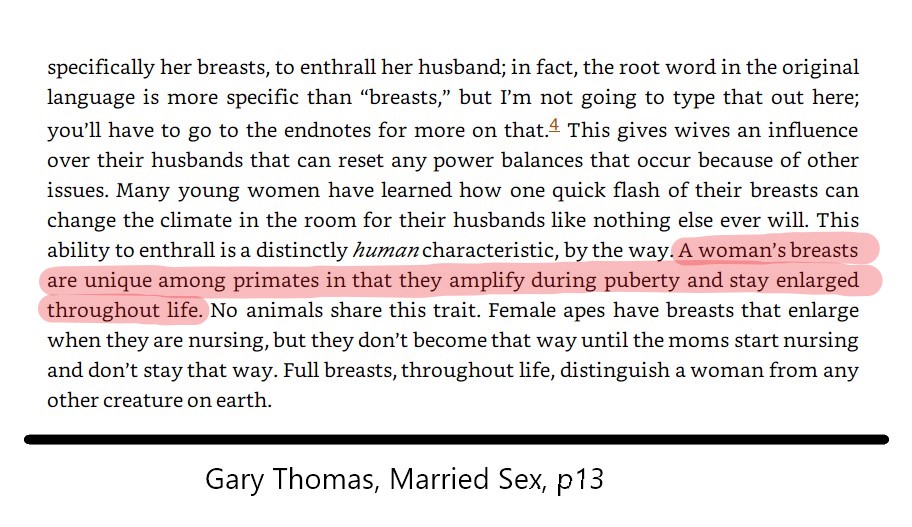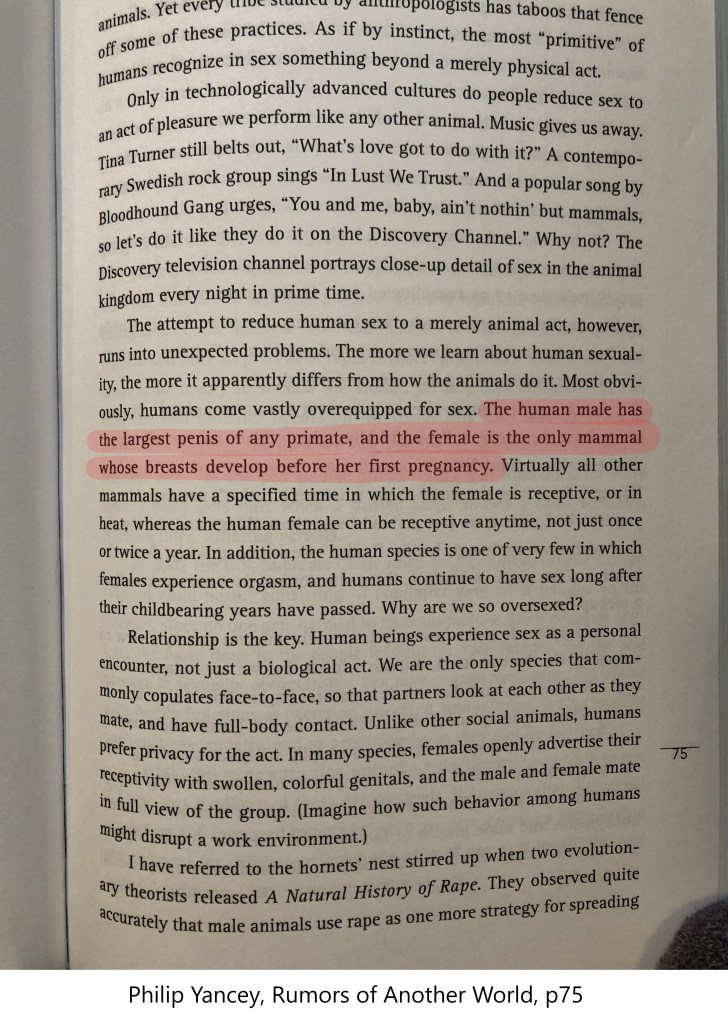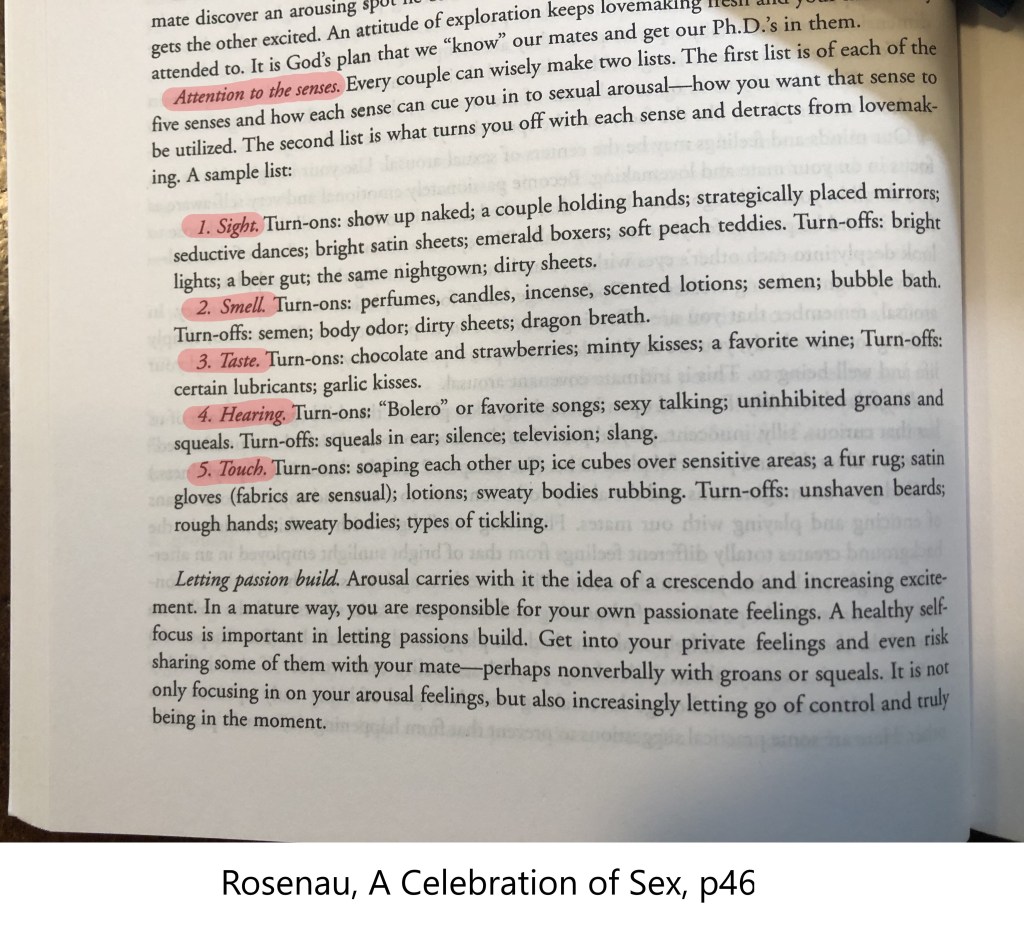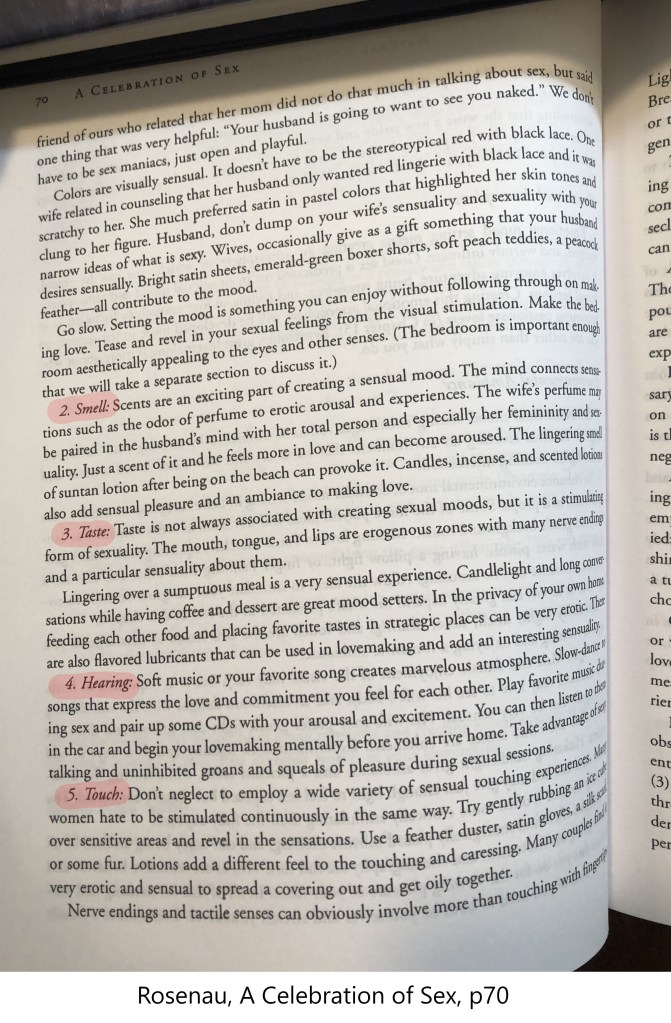Sigh. Every time I mention Gary Thomas and Debra Fileta’s book Married Sex in one of my posts, I think, This will be the last time I mention their book. Except, for me, their book has come to encapsulate much of what is wrong with conservative white evangelism, and so I repeatedly find myself coming back to it. This spring, a social media firestorm erupted after The Gospel Coalition (TGC) published an article endorsing Joshua Butler’s new book Beautiful Union. Positioned by TGC’s senior editor Brett McCracken to be the new “protestant magnum opus” on sex, Beautiful Union compares the Holy Spirit to semen, calls the male orgasm a “sacrifice,” pressures women to have obligation sex by shaming them for being “churlish” in the bedroom, and never once mentions the female clitoris. Sigh.
I experienced severe déjà vu as things played out. [My original critique of Thomas & Fileta’s Married Sex can be found here: “Married Sex” Lacks Strong Biblical Exegesis]
TGC’s article was written pre-release and was intended to build hype for Butler’s book. The only reason social media became aware of this book was because TGC chose to highlight the passages they thought were particularly praiseworthy, similar to the way Gary Thomas’ pre-release blog post brought unwanted attention to his forthcoming book. Thankfully, the backlash to Butler’s article from people of all theological persuasions was so great, TGC chose to retract their article endorsing Butler’s book. (Later, however, McCracken posted a review dripping with praise on Amazon.) Here are several of the more prominent critiques. (There are many, many more.)1
Beth Felker Jones in Premier Christianity
Augustine would be baffled by Joshua Butler’s sex article
Amy Peeler in Christianity Today
The Bible’s Marriage Metaphor Doesn’t Belong In the Bedroom
Jennifer Greenberg, a regular contributor for TGC wrote this article for TGC, which they initially agreed to publish, but then rejected
How did Butler respond? He doubled-down, insisted he was being misrepresented, and called his critics prudes, (as did Gary Thomas and Debra Fileta, when readers critiqued their book.)
Butler’s publisher Multnomah released Chapter One, saying quotes were being taken out of context (as did Zondervan for Married Sex.) Except critics didn’t find the chapter redemptive, they found even more concerning content. Then Butler, like Thomas and Fileta, insisted one must purchase ($$$) and read the whole book to understand its beauty. I was one of the people who bought Married Sex when its authors insisted they were being misunderstood. I refused to give my money to another author for a book where the first chapter was so obviously bad, but Dr. Laura Robinson provided a detailed series on the whole book:
Part 1: Beautiful Union, Which I Read, You Monsters
Part 2: What Do Words Even Mean?
Part 3: The “Generosity/Hospitality” Language Game
Part 4: Is There a Female Orgasm?
Part 5: Shell Game with Vulvas
Part 6: Feeling Unsatisfied
She summarizes:
1. The thesis of sex as an icon is not controlled, and this thesis is not reliably defended or applied in the text.
2. The argument style depends on free associations with minimal interpretive controls. Either the controls are the pre-existing beliefs and experiences of the team that produced the book, or they are created from exegesis of biblical passages. However, this exegesis depends on a poor understanding of biblical interpretation and the use of languages.
3. The book is slippery in its deployment of definitions and values, presenting a false face of mutuality in sex while redefining “generosity” and “giving” in sex to include only male self-gratification.
4. The book thinks that women orgasm from penetration at the same time that their male partners do, and displays no awareness of the clitoris or the ways in which women actually do have orgasms during sex.
5. The book diminishes the role of women in reproduction while elevating men’s.
Like Married Sex, the foundational problems of the first chapter were found throughout Beautiful Union (of course), but the evangelical-industrial complex continued to platform Butler and push for sales.
After the initial wave of bad publicity died down, people who had originally endorsed the book started defending their decision. Dr. Juli Slattery, one of conservative white evangelical’s pre-eminent sex teachers, who endorsed both Married Sex and Beautiful Union, had Butler on her podcast to praise his book. Instead of directly addressing the concerns that had been raised, Slattery and Butler again deflected by saying critics were uncomfortable talking about sex & God—the same argument Gary Thomas and Debra Fileta used. To insinuate that fellow sex authors, bloggers, teachers, professors, domestic violence survivors, and abuse advocates are not comfortable talking about God and sex is ridiculous, exhausting, and infuriating.
Then, on a different podcast, the host brought up some of sex author Sheila Gregoire’s critiques of Butler’s book. Butler read a statement he had prepared in advance, dismissing Gregoire’s work, even though he had cited Gregoire’s work in his book. Gregoire has been very outspoken on social media about the ways Butler misused her research in his book to support his thesis and then dismissed her research in subsequent interviews.
An interesting connection between Married Sex and Beautiful Union is the way both books misrepresented female authors to support their theses. In addition to Sheila Gregoire, Butler name dropped Emily Nagoski, a female author dedicated to helping women pursue pleasure, without actually ever centering female pleasure in his book. Gary Thomas similarly name-dropped Esther Perel in a way that misrepresented her work that I didn’t address in my initial review of Married Sex because there were too many issues to address in one review.
Esther Perel is the international bestselling author of Mating in Captivity, a well-known book outside of conservative evangelical circles, but rarely read inside them because evangelicals mostly seek evangelical literature for their sexual education. In Married Sex, Gary Thomas shares an anecdote from Perel’s book about a woman “all for egalitarianism” who revels in the thrill of “losing control and letting someone else take charge” (140-1) in the bedroom to pressure women to let their husbands lead in the bedroom. The problem is, Perel advocates for intelligent eroticism—the idea that eroticism desires excitement, unpredictability, and danger—which means for a complementarian couple (Gary Thomas’ primary audience), where by day, man leads and woman submits, it would be erotic for the woman to lead in the bedroom and the man submit (female dominant sex). Perel writes: “The power differential that would be unacceptable in her emotional relationship with Vito is precisely what excites Elizabeth erotically” (Married Sex 141). Perel was saying that male dominant sex can be erotic for the female WHEN she is in an egalitarian relationship. I find it ironic that instead of highlighting the main points from her book, the one nugget of wisdom Gary Thomas decided to share for his complementarian audience was an anecdotal story of a woman who revels in the thrill of “losing control” and letting the man “take charge” in the bedroom.
This anecdote from Perel is found in Chapter 9 – “En Gedi Sex” of Thomas’ book. Thomas shares three stories— one of a wife providing multiple blow jobs a day for her husband on a trip, one of a husband providing a bubble bath for his wife once a week, and then this third, random, very long excerpt from Perel’s book. It’s like Thomas had to find a way to fit this example of a secular author writing about an egalitarian woman’s desire to surrender control in the bedroom somewhere in his book. Thomas misused Perel to reinforce his already stated view that women surrender: “The very act of sex speaks of profound differences in gender: forcefulness that requires gentleness, initiation that requires receiving, control met with surrender” (55).
I believe conservative evangelicals have a legitimacy complex. Christian “apologetics” are big business. Evangelicals are obsessed with being relevant to “secular” or even “egalitarian” Christian culture and proving themselves superior. (Ironically, these Christian apologetic books intended to “prove” the logic of Christianity to outsiders are rarely read outside the evangelical bubble but are huge money-makers within evangelicism.) The zeal of evangelicals to prove their legitimacy to the larger culture often warps their ability to engage critically with a text. They name drop to make themselves sound cosmopolitan, and it’s another way they are using women for their own ends.
Which brings me to evangelical scholarship and authority. Most of the authors platformed in the evangelical-industrial complex are not experts in their fields. Gary Thomas has a master’s degree in systematic theology. He is not a licensed counselor. In my original review, I focused not only on the problematic theology of Married Sex, but also on the general lack of theology in Married Sex—Gary Thomas fails to leverage his theology degree to exegete Scripture, but instead (ab)uses his pastoral authority to make bold claims about male and female sexuality based on opinions, preferences, pseudo-science, and life experiences. I’m not sure what theology has to do with using make-up brushes on a man’s testicles (71), but that’s one of the more harmless tidbits Thomas doles out in Married Sex.
Stephen Arterburn, author of the best-selling Everyman’s Battle series, founder of the Woman of Faith conference, and host of radio counseling network NewLife is on his third marriage and has a M.Ed in elementary education. (I’m not condemning someone for being on their third marriage, but they should not be platformed as a conservative evangelical marriage expert.) He once wrote, “I graduated college with the easiest degree I could find, just to get out,” but positions himself as a mental health professional. He’s one of the biggest cons in the evangelical-industrial complex. He has no legitimate degrees or experience for the level of platform he’s been given—this is not a bug of the evangelical-industrial complex, but a feature.
Sheila Gregoire and her team recently tried to track down the commonly quoted statistic that women speak twice as many words a day as men. It appears that statistic was pulled out of thin air by James Dobson of Focus of the Family back in 1987 in his book Love for a Lifetime. His made-up statistic has been cited as fact across multiple books, studies, and sermons for decades. Gregoire covers the history of this startling trend in Chapter 10 of She Deserves Better. It seems Dobson also made up the often cited 72-hour rule.
Denny Burke, director of the Council on Biblical Manhood and Womanhood, endorsed Beautiful Union and critiqued Sheila Gregoire’s The Great Sex Rescue by falsely claiming her book didn’t address procreation, and later admitted he hadn’t even read her book.
Several big names who endorsed Beautiful Union pulled their endorsement after the backlash, admitting they hadn’t read the book. Since then, many authors have publicly confessed that endorsing (or critiquing) books without reading them is a feature of the system, not a fluke.
After reading Married Sex, as I began to wrestle with why such a problematic book was platformed and still selling relatively well considering all the negative press it received on release, I’ve had to reckon with the reality that the majority of white evangelical’s most well-known teachers and organizations are a sham driven by profit and ego. The publication of Beautiful Union cemented my conviction. Katelyn Beaty addresses the issues of the white evangelical industrial complex in her new book Celebrities for Jesus: How Personas, Platforms, and Profits Are Hurting the Church:
“[Beaty’s book] is a careful study of how our current Christian celebrity culture developed, why it is harmful, and how abuses of power naturally arise when people who start out as sincere leaders become isolated from others, lack adequate accountability, and become used to getting things done through the success of their ministry and the force of their personality….
In one chapter, Beaty focuses on the role of the Christian publishing industry. She honors her own and others’ work to serve the church through publishing, but she grapples with harsh realities of how secular buy-outs of major Christian publishers and the siren song of profit have caused the Christian book industry to create a gatekeeping, celebrity-driven machine that prioritizes someone’s popularity over their spiritual maturity or hard-earned wisdom. Beaty also addresses issues related to plagiarism, unacknowledged ghostwriters, and attaining bestseller ratings through unethical means.”
– review by Bethany Davidson
While the circumstances surrounding the release of Beautiful Union reminded me of all the problems with the evangelical-industrial complex and its celebrity authors generally, I was also reminded of the issues with Married Sex specifically that I didn’t cover in my initial review. Gary Thomas churns out a book every two years on topics ranging from spiritual devotionals to dating to marriage to sex to parenting to physical health. Because his paycheck comes from the number of books he sells, he is motivated to continue writing books. He is not an expert on most of these topics, either by credentials or a lifetime focus in a specific area, which means he has to rely on the expertise of others. His sections in the book Married Sex are mostly book reports of other people’s work with other’s anecdotal stories sprinkled throughout. Not necessarily problematic, but if you’re going to draw from the work of other people, you need to cite them properly. Here’s some of the glaring examples I noticed of Thomas borrowing from other people without citing them properly:
Though things got lost in translation, I suspect Thomas was trying to channel Philip Yancey in “Designer Sex” when Thomas compared women’s breast to monkey teats:
Thomas specifically let us know his preference for silk scarves and makeup brushes instead of keeping it professional (and mutual) like Clifford & Joyce Penner:
Thomas cites Douglas Rosenau once in his “positions” section, but honestly, it feels like Thomas is constantly paraphrasing Rosenau’s Celebration of Sex throughout the book. In Chapter 8 -The Five Senses of Sex, it felt like if you removed all of Thomas’ anecdotes, all you would have left is Rosenau:

Perhaps most disturbing is early in the book, when he channels Doug Wilson to establish some foundational “truths” about God’s design for sex:
Sheila Gregoire called out his failure to cite her. She contacted Zondervan, and Gary Thomas has chosen to remove the debated passages from future printings rather than cite her properly.
Gregoire mentioned that she also noticed Thomas channeling Kevin Leman & Emily Nagoski with no citation, and I have seen several people on social media mention that Mark Driscoll encouraged women to flash their breasts in his book way before Thomas did.
I know Gary Thomas has read many of these authors because he has referenced them on his blog in the past. In Thomas’ sections of Married Sex, if you remove all of the material of other authors, both those cited and not, and all of the personal anecdotes of other people, (I hope Jocelyn is receiving royalties for her contributions to the book, because Thomas quotes her maybe more than he quotes Scripture),
there’s almost nothing left.
It’s also telling that many of the authors Gary Thomas chose to cite are authors that endorse and platform his work on a regular basis, including Juli Slattery, who also endorsed Joshua Butler. Recently, Joshua Butler recommended Married Sex on a podcast, then Gary Thomas chimed in to defend Butler (without actually citing Butler by name), claiming a “mob” tried to cancel an “entire 70,000-word book discounted by a 300-word excerpt.” To be clear, women aren’t calling out a flippant phrase here or there, they’re calling out the harmful patriarchal ideology undergirding both books. Thomas goes on to call the criticism of Beautiful Union1 and Married Sex, “part of Satan’s strategy to discourage the teacher and to undercut her or his calling.” Please sit with the arrogance of that statement for a minute. Thomas and Butler are called by God (to write books for profit); their female critics are vessels of Satan. Thomas tries to speak out of both sides of his mouth by caveating that “respectful dialogue is beautiful, encouraging, and often enjoyable and helpful,” except over and over and over again, Thomas has shut down conversation with anyone who disagrees with him while claiming he’s the “victim” being “cancelled.” Sigh. (After I posted this article, Focus on the Family platformed Juli Slattery on an Instagram reel, and actively deleted user comments that referenced Gregoire or The Great Sex Rescue.)
White male supremacy reigns in conservative white evangelism. Only women (Debra Fileta, Juli Slattery, etc.) who are willing to prop up patriarchy (male leadership, female submission), who are willing to preach patriarchy louder than the men or package it prettier are “elevated” to “leadership.” Most of the criticisms of Married Sex and Beautiful Union came from women. The majority of these women often have education levels and experience that match or exceed Thomas’ and Butler’s, but because of patriarchy, have no official platforms to amplify their voice to call out the misogyny found in Married Sex and Beautiful Union. It’s a feature of conservative white evangelism. These women share their critiques through blogs and social media. For Butler’s book, some female experts in their fields were able to publish their rebuttals through professional outlets, yet Thomas calls his critics “carnal members of the church” for speaking out. I suppose these women do not have the self-appointed, for-profit “calling” of Thomas and Butler. White evangelical married sex is not a beautiful union when women are only valuable to the extent that they are willing to praise men.
For the health of the church, we must do better.
Dr. Laura Robinson, who wrote a six-part series about the problems with Beautiful Union, concluded her critique with a beautiful lament on the treatment of women in the public sphere. I cried when I read it: The Conversation about the Conversation
1 – More critiques of Beautiful Union that I haven’t already linked to in my post:
BareMarriage (many additional links are included within article), Goodreads, Baptist News, A Cry For Justice, Hot,Holy&Humorous, Aimee Byrd. Again, this is just a sampling of critiques scattered across the internet from diverse theological backgrounds. The critiques come from authors, professors, advocates, survivors, and sexperts.
Are their critiques of Beautiful Union “part of Satan’s strategy” as Gary Thomas implied?
Related Posts:
Sex Idol: Where Evangelicals Worship & Women are Sacrificed – I was struggling in the bedroom, but most of the obvious suspects were missing. I came from a relatively healthy family, I was never sexually abused, and I was an evangelical poster child when it came to my sexual history. Eventually, I realized my evangelical religion was the problem.
Patriarchy: Porn & Purity Culture – a reflection on my complex history with purity culture
Age of Patriarchy: Desire of Woman & Rule of Man – The Hebrew word desire only occurs three times in Old Testament – I explore the significance of the man’s desire in Song of Songs 7:10 echoing the woman’s desire in the curse of Genesis 3:16.
Thanks for reading Holy Tension! Subscribe for free to receive new posts.
Follow HolyTension on social media:











I added Laura Robinson’s own summary of her blog series below the links to her blog after I originally posted
LikeLike
Oh snap!! Good catches on the similarities to other books…I really admire your scrutiny. One minor stirring I feel the need to push back on would be your need to bring skin color into every article and your About Me page? It really takes away from your content. You can say “conservative evangelical” without calling it white. There are thousands of ways to classify a person (upbringing, culture, profession, education, race, income), so when you say “white”, it really doesn’t narrow anything down. Just a gentle challenge for you as you continue to put out thoughtful content 💗.
1 Sam 16:7
But the LORD said to Samuel, “Do not look on his appearance or on the height of his stature, because I have rejected him. For the LORD sees not as man sees: man looks on the outward appearance, but the LORD looks on the heart.”
LikeLike
Dear A P,
You’re not the first reader who’s asked why I choose to use the term “white” so often in my writing, and it’s something I’ve been wanting to address for awhile, so I wrote a new post to explain why I think race is an important part of the evangelical discussion. Thank you for your feedback!
LikeLike